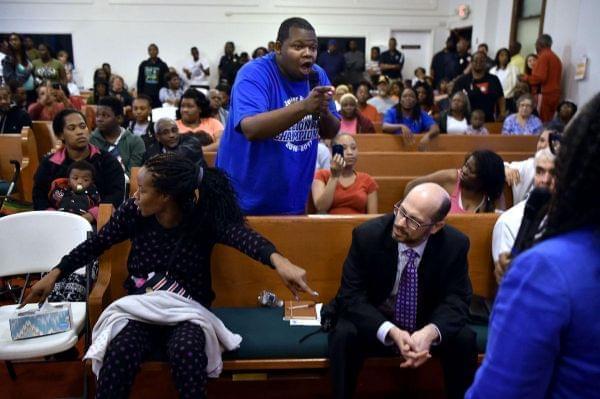Illinois Issues: Cairo Faces Public Housing Crisis

Kevin McAllister of Cairo responds in anger to a Housing and Urban Development announcement of plans to relocate families from beleaguered low-income housing complexes to areas outside of Cairo. Kevin Sitler/The Southern Illinoisan
As the sun set on a recent Friday evening at the McBride apartment complex in Cairo, people gathered in a yard between the building rows.
Young girls practiced cartwheels. Boys played chase. And a dozen or so teens stood around talking about their pride in Cairo: several noted the long tradition of success on the high school basketball court, as well as the love that can be found in this city. Sounds of music, conversation and laughter filled the air.
It was the scene of an impromptu neighborhood block party set against the backdrop of a housing complex that represents government failure at multiple levels. In recent months, a housing crisis that has been brewing for years in Cairo has culminated in a social disaster.

On a recent Friday evening, Cairo teens hang out at McBride apartment complex in Cairo.
A mother pushing her baby in a stroller said she would be gone by the following Monday. The mother, who asked that her name be withheld, and her children, represent one of 10 families that Housing and Urban Development officials had helped relocate from the McBride and Elmwood complexes as of this past week.
But more than 160 families still remain at the sprawling, World War II-era complexes that have fallen into extreme disrepair. Those families comprise about 400 people, close to half of them children.
On April 10, federal Housing and Urban Development officials told families of the two complexes that they were going to begin moving people because the units are no longer safe or sanitary. Leaking upstairs toilets and sinks drip down into the kitchens below, residents contended in a lawsuit. Inadequate heating systems have forced people to use their ovens to say warm. People have complained of roaches, rats, bedbugs. One resident claimed (in the lawsuit) that there were maggots in the refrigerator issued to him by the housing authority.
Eventually, HUD plans to raze the 76-year-old apartment complexes.
HUD outlines plan forward
Four months ago, HUD officials called a meeting in Cairo to tell residents the news. The event took place at a Baptist church in this historic, predominately African-American city of about 2,400 that lies at the bottom tip of Illinois, where the Ohio River marries the Mississippi.
Residents, community members and federal officials filled the pews and stood along the edges of the room. If it had been Sunday, such an attendance record would have been cause for celebration. But the news HUD delivered that day was devastating to many. “If I had known you all were coming to break our hearts, you wouldn’t have done it here,” the Rev. Jimmy Ellis, told HUD officials at the meeting.
Towanda Macon, director of operations for Illinois public housing at HUD’s Region V office in Chicago, was called upon by her agency to deliver the news. Macon has been serving as co-administrator of the Alexander County Housing Authority since February 22, 2016. That day, the federal housing agency, citing years of mismanagement and alleged civil rights violations against residents and workers, dismissed local managers and seized control of the AHCA operations, placing it into what HUD calls administrative receivership.
Macon told the residents that she was grateful to everyone who had welcomed her in their city. She said HUD studied the issue for more than a year and did not arrive at the decision lightly. For years, residents have complained of the poor living conditions, including security issues.
Aggravating raw feelings is that the former ACHA managers entrusted to oversee the public housing engaged in a pattern of gross mismanagement and neglect, as outlined in volumes of HUD documents and an extensive independent review by The Southern Illinoisan.
“I did not want to come in here and tell you that this was the outcome we’ve gotten to,” she said. “But quite frankly, we have no other decision for everything you have just mentioned. Bed bugs. Mice. I have people calling me every day saying, ‘You know what, the $150,000 you’re spending on pests, it ain’t working. The $150,000 you’re spending on rats, it ain’t working.’
“So guess what, that leaves me in a position to tell me that there are health and safety concerns for our children, right, that’s the first priority and concern.
“Do I want to see a community destroyed? No I don’t. But at this point we don’t have any other solutions.”
HUD has gained lots of experience over the years in moving people from their homes who don’t want to go – for myriad reasons as it relates to both the relocation efforts and resistance. The scenarios that play out are almost always heartbreaking, even when the decision is driven by a need to protect residents’ health and safety.
But this particular crisis is unique for the federal housing agency because even though forced relocations have changed the shape and makeup of neighborhoods in larger cities, very rarely does HUD face a situation in which relocating residents threatens to decimate the fabric of an entire city.
In addition to telling residents that the Elmwood and McBride complexes had gone so far into disrepair that it did not make financial sense to salvage them, Macon also had to break the news to residents that HUD was not going to build new public housing units in Cairo. Roughly one in four Cairo residents reside in public housing, according to the city. Upwards of 40 percent of the children who attend Cairo Unit School District 1 live at Elmwood and McBride.

HUD Secretary Ben Carson speaks to Cairo residents at a meeting last week.
A longstanding practice at HUD that predates this current administration, but that also is endorsed by HUD Secretary Ben Carson, is for the government to partner with private developers for the construction of new government subsidized housing. Despite a year of trying, across two administrations, the math just didn’t add up for those who studied the depressed Cairo market, which has been on a downward economic and population trajectory for the better part of a century, according to HUD officials and other housing experts familiar with the situation.
Many residents do not like the options they’ve been given. The solution that the federal agency is offering is to provide residents with what HUD calls Tenant Protection Vouchers. The vouchers are issued during forced relocations and work the same as a Housing Choice Voucher in subsidizing rent paid to a private landlord, either an individual homeowner or multifamily property owner. The vouchers are good for as long as an individual remains qualified.
At the meeting, there was yelling, pleading and crying. Kevin McAllister stood up and pointed a finger sternly at Macon and told her that it was unjust that the best solution HUD could come up with was “tell us to get the hell out – and your community is destroyed.”
“Because that’s what’s going to happen,” said McAllister, a father who lives at Elmwood and who drives a school bus for a living.
HUD: ‘It’s never easy’
HUD spokesman Jereon Brown, who has been a part of various HUD teams assigned to assist in the relocation of public housing residents through the years —including this most recent effort in Cairo — says, “it’s never easy to tell families they have to relocate.
“We faced protesters and near-riot conditions in New Orleans. Mounted police officers had to get us out of the courthouse,” Brown says about an undertaking by the city and HUD in 2007 to tear down four large housing complexes after damage during Hurricane Katrina two years prior.
“Even in East Chicago, some people don’t want to move off of a Superfund site,” he says, referencing a recent relocation effort of about 270 families, roughly 1,000 people, from a northwest Indiana housing complexes that was built at the contaminated site of a former lead-products factory.
“No matter the reason, telling people they have to leave home is one of the toughest parts of our job. It’s not something you forget,” Brown says. “On the flipside, it’s great when someone can come back to a rebuilt home. Many of those from New Orleans now get to live out their lives in new homes, and they now have a little more faith that government does its best to live up to its promises.”
In Cairo, however, HUD has not made a promise for new housing — only to try to give residents choices in relocating to other communities. Brown says HUD understands how much people are attached to their home city, where many families have lived for generations, and officials there did not arrive at this decision lightly. He noted that Cairo, which sits in an isolated region in Illinois at the border of Kentucky and Missouri, is particularly geographically challenged.
In Cairo, HUD has been roundly criticized for, in its oversight role, not stepping in sooner to correct the alleged misuse of funds by local housing authority managers and failing to flag the deteriorating conditions of the buildings sooner. Therefore, many residents have made a ‘you break it, you buy it,’ type of argument in suggesting that HUD owes the people of Cairo an investment in new housing, even if the private sector piece does not fall into place.
Carson, who visited Cairo last week, said that HUD bears some of the responsibility for what’s happened in Cairo. That’s why the federal agency is expending its time and resources to assist residents in finding alternative safe housing options, he says. He also says that HUD has made efforts to tighten internal controls and improve communication among departments. He said the inspection process has been reviewed, and 42 contract inspectors across the country were dismissed because of inconsistencies between reports, or between reports and actual conditions, as might have been the case in Alexander County.
But Carson says that from the perspective of a federal agency, regardless of what went wrong in the past, there has to be a balance between compassion and common sense in determining the best path forward. After visiting Cairo, Carson did not offer a new pot of federal money to reverse the previous decision his staff announced. What he offered was to listen to concerns and ideas and to direct his team to do the best they could to preserve as many units as they could.

For example, Carson said he would commit his staff to continuing to work with city leaders to see if a private partner could still be secured to add to the city’s affordable housing stock. Carson also said he hoped his visit would elevate the economic potential, citing the confluence of two major rivers, a viable rail system and the nearby interstate access. “It seems unfair that the people who are here now have to suffer the consequences of the mistakes that were made by others,” Carson says. “But unfortunately, that’s the world that we live in. There is a lot of unfairness in our world. …
“But that’s when you begin to work and to fight even harder to be able to salvage what’s going on.”
The Rev. Phillip Matthews, a Cairo community activist and chairman of the Alexander County Democratic Party, was one of about a dozen community leaders who had a private meeting with Carson before he spoke to residents in the school gymnasium. “He made no promises, but wanted to hear solutions and put something on the table.” Matthews says one of the solutions he and others offered to Carson was that the HUD team assigned to Cairo let people continue to live in some of the buildings at Elmwood and McBride and use a portion of the money earmarked for the relocation effort to maintain the boiler system and keep the lights on. “He’s open to that.”
Brown, with HUD, described it as a delicate balancing act between keeping all options on the table and being realistic about the situation. Regardless of how people may have interpreted Carson’s comments, Brown says the agency is still encouraging people to move.

The Rev. Phillip Matthews, a Cairo community activist and chairman of the Alexander County Democratic Party, was one of about a dozen community leaders who had a private meeting with Carson.
There has not been any new residential housing built in Cairo in 40 years, according to a recent city resolution, and the possibility of a large development coming to fruition before residents have to move remains an uncertain prospect.
Brown says HUD can work indirectly to help revive Alexander County’s economy. But it also takes a commitment of the county, region and state, he said. And he stressed that the rebuilding of economies takes time, even in the best of circumstances. Time is not on anyone’s side in this situation given that the health and safety concerns of residents have to be prioritized before all else, he says.
It’s an unfortunate reality that the public housing residents of Cairo are paying for “sins of the past,” Brown says, “Candidly though, you can’t move forward when staring in the review mirror."
In the review mirror
The Southern Illinosan spent two years reviewing the alleged mismanagement that has left the ACHA in a financial state that Carson described, in a letter, as “nearly bankrupt.”
Citing documents from HUD reviews and records obtained by the ACHA, the newspaper found that numerous questionable contracts and legal settlements, conflicts of interest between management and the union representing workers, generous benefits, golden parachute retirement deals, bonuses and excessive travel and dining played a role in crippling the ACHA, while maintenance and upkeep of the housing complexes was largely neglected. What HUD described as abnormally high utility costs also was a factor in driving the housing authority into a state of insolvency, according to an April financial review by HUD.
James Wilson, who was the local manager of the ACHA from 1989 to 2013, told The Southern Illinoisan in the fall of 2015 that the housing authority was “just like the state of Illinois” and “lived it up too good,” while still defending his 24-year tenure at the housing authority.
He said HUD officials in Chicago did not indicate to him he was doing anything wrong until close to his retirement. He said some of the buyouts that have been called into question were designed to save money when the housing authority could no longer afford to keep everyone on the payroll. Wilson also served as mayor for part of that time, from 1991 to 2003.
HUD has taken administrative action against Wilson and two other ACHA administrators, seeking to bar them from ever again participating in activities involving federal funds. The debarment notices to Wilson, former longtime assistant executive director Martha Franklin, and board member and union negotiator John Price, state that their actions are “evidence of serious irresponsibility.”
If HUD is successful in the initial punitive action, Brown says the next step in the process will be to seek fines in an attempt to recover some of the money that HUD alleges was misspent.
“I admire the Cairo spirit, and I understand the cry for justice. The truth is we'll never get the millions of dollars back,” Brown said. “We will try to do what we can about those who have misappropriated funding. We may be successful on a smaller scale, but the money will never be enough to replace the suffering caused.”
In response to the debarment action, Wilson said that HUD is mostly to blame, not the ACHA. It will all come out in time, he said.

HUD Secretary Ben Carson, while walking around McBride apartment complex on August 8, shakes hands with McBride resident Terri Childs.
In Cairo, no easy answers
Anedra Collier, a mother of seven children, is looking to relocate to Carbondale, where she’s entering her senior year studying accounting at Southern Illinois University. She estimated her seven children are the seventh generation in the family to have lived at McBride at one point or another. Noting the lack of resources in Cairo, Collier says HUD should “let the cards fall where they will” and “let the people go somewhere else.” She notes that the town’s only grocery store closed in 2015. There is no gas station. While there are many caring educators at the school district, she said the resources for children are limited.
But there are differences of opinion – even within families. Collier’s mother, Loretta Collier, and her aunt, Terri Childs, both want desperately to remain in Cairo, where they have deep familial roots. Both said they are stressed and worried about where they will go, and whether they will fit in at a new place. Childs said she’s concerned she will lose her job at the school, where she works as a teacher’s aide, if the enrollment plummets throughout the year.
Before Carson’s visit she hoped he would empathize with her desire to stay put. She ran into him while he was walking around McBride place on Tuesday with Mayor Tyrone Coleman, U.S. Rep. Mike Bost and a security detail. He was friendly, she said, but she did not get the impression that the visit was going to change much.
“Just protocol, and that’s all,” is how she summed up Carson’s visit.
Brown said that everyone at HUD understands the gravity of the situation. It was not a decision made void of compassion. “Right now, the most predictable issue is the housing authority’s failure unless we can continue with this triage operation.”
“There’s no doubt that this relocation effort is not going to be perfect, but the hiccups that occur won’t be because of a lack of trying or caring.”
With cold weather only a few months away, Brown says that HUD’s “worst fears” are boilers that break and not having the money to repair them.
“There aren’t any easy or perfect answers here. There are only hard questions and a determination to stop kicking the can down the road and address today’s situation.”
Molly Parker is a reporter for The Southern Illinoisan.
Illinois Issues is in-depth reporting and analysis that takes you beyond the headlines to provide a deeper understanding of our state. Illinois Issues is produced by NPR Illinois in Springfield.
Links
- Illinois Medicaid Providers Still Struggling; Cairo Responds to Secretary Carson’s Visit
- HUD Secretary Ben Carson Visits Cairo; School Funding; Last-Minute Summer Travel Plans
- HUD To Begin Relocating Families From Public Housing In Cairo, Ill.
- A Public Housing Crisis In Cairo; Illinois Politics Update; Debunking Fast Food Myths
- Tired Of Promises, Struggling Cairo, Ill. Wants Problems Solved
- Authorities Spent On Trips And Bonuses As Family Housing Units Languished In Cairo
- Evacuated Cairo Residents Allowed to Check Property
